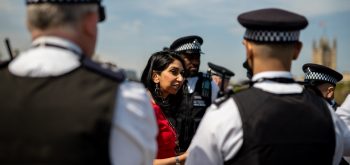A culture of domestic violence within the police is perpetuated by cover-ups and wilful ignorance, according to a new report by Channel 4. At least 129 women have approached the Centre for Women’s Justice (CWJ) since 2019 with claims of being raped, beaten, and coerced by their police officer partners.
One survivor, ‘Stacy’, reports being trapped in an abusive relationship with her police officer partner for almost 20 years. After gathering the courage to report the ongoing abuse of herself and her children, she went to the Child Protection Unit of her partner’s police force. ‘They were all of his mates’, she says. ‘It’s a boy’s club. Police are supposed to be there to be trusted and they’re not. I can’t trust them’. Her case has now been closed.
Other survivors interviewed by Channel 4 reported failures by senior officers to investigate those within their ranks, and flagrant abuses of power and status to conceal wrongdoings. Describing domestic abuse within the police as an ‘epidemic’, former Scotland Yard Deputy Police Commissioner David Gilbertson said: ‘It is about men in authority exercising power over women and it is about failure of leadership on an epic scale in policing’. ‘I know of cases where officers who were attached to Domestic Violence Units actively searched out vulnerable women for sexual gratification and in order to gain access to their children for sexual purposes’.
A police super-complaint was submitted by the CWJ in March 2020 after Freedom of Information requests lodged by the Bureau of Investigative Journalism uncovered over 700 reports of domestic violence perpetrated by police officers within the preceding three years. Figures also show that the likelihood of a conviction where the accused is a police officer is just 3.9% – a third less likely than if the alleged abuser were a member of the general public (6.2%). The super-complaint highlights a number of common themes which pervade police responses to accusations of domestic abuse by a police officer. These include failures to investigate, improper manipulation of police processes, and accused officers using their status and links to manipulate cases against them.
One woman surveyed by CWJ discovered that her written statement to the police had been given to her husband, the suspect. She was later told that her statement had never been filed, and that there were no records of it. Another woman reported that during family court proceedings, her police officer ex-partner forced entry to her home and stole her property. Upon calling the police the woman was told that they were ‘aware of the situation’, but there was nothing they could do as it was a ‘civil matter’.
The super-complaint made a number of recommendations, including the establishment of an external investigating force to create barrier between the investigation and the parties, and an independent hotline for victims. One of the women whose story was included in the super-complaint said: ‘I felt incredibly let down by the police, I felt that I was being made a victim a second time, I hope something good will come out of the super-complaint to help other women in the future’.
Despite its publication last year, the super-complaint has recently gained traction in light of the alleged murder of Sarah Everard by a serving police officer, and the Metropolitan Police’s subsequent handling of her vigil held on Clapham Common. HM Chief Inspector of Constabulary, senior representatives from the Independent Office for Police Conduct and the College of Policing are now investigating all English and Welsh police forces, and are due to publish a report on their findings shortly. ‘We rightly expect each allegation to be investigated thoroughly, with the appropriate action taken’, said a Home Office Spokesman.







